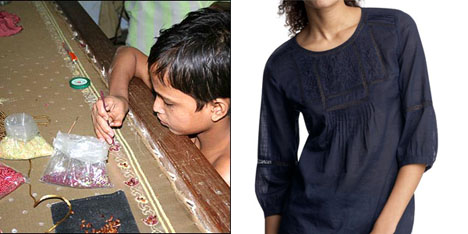 I hate spending money. I LOVE getting a good deal.
I hate spending money. I LOVE getting a good deal.
So I shop at stores that sell really cheap clothes, like Forever 21, Old Navy, Ross, Charlotte Russe, Marshall’s and Dillard’s. And those are just a few of my favorite places to find amazing deals on the most current fashions. Just today while perusing the “sale” page of Forever 21’s website, I found a pair of stylish print leggings for $5! Not to mention the cute sleeveless, collared top to go with it for just $10! And as my boy’s school year started, I only spent $50 online at Old Navy and bought 4 pairs of shorts and 7 shirts! Plus FREE shipping! Holy crap, what a deal!!
I’ll search all over the internet for a good deal, passing up “decent” deal after deal looking for that special one. In fact, as I’m typing this, I’m sorta realizing how obsessed I am with it.
Have you ever really thought about how it is that these clothes are so darn cheap? I have, but only a few times. Mostly I just see the deal and take it! I mean, I’ve wondered, “Could these retailers possibly be employing sweatshops to make their clothes?” But it pretty much ended there. Researching felt a little dangerous. Because if I found something, I’d have to respond. And then I’d have to choose: continuing shopping there or spend more money elsewhere.
Then a couple weeks ago, my husband Markus, was teaching a message at our church on poverty. He asked the room this question,
“Do you ever do the research to find out if the places you shop perpetuate the cycle of poverty because they employ sweatshops?” Alright, alright, enough already. I decided to research.
And I was sick at what I found…
On December 12, 2012, The U.S. Department of Labor said it found widespread “sweatshop-like” labor violations in downtown LA’s fashion district, resulting in the recovery of more than $326,200 in back wages for 185 employees.
Each of the 10 garment contractors inspected during an unannounced sweep of a single factory earlier that year were found to be paying less than minimum wage, not paying overtime, or falsifying or failing to maintain records, the Labor Department said.
The garments being produced were for more than 30 retailers nationwide, including Aldo, Burlington Coat Factory, Charlotte Russe, Dillard’s, Forever 21, Home Shopping Network, Rainbow Apparel, Ross Stores, TJ Maxx, Marshall’s, Urban Outfitters and Wet Seal.
When federal and state investigators searched the large garment building at 830 S. Hill St. in downtown LA, they found that many workers were paid a piece rate — in other words, per piece they sewed — even if that was lower than minimum wage. One Los Angeles factory worker told Bloomberg Business Week that she was paid 12 cents a piece to sew vests that sell for $13.80 (115x more than what it cost to make it). Which also means she would have to make 67 vests an hour to earn $8 minimum wage. This is insanity.
Labor expert, Robert Ross of Clark University said, “Nobody in the world is making a living if a retailer is selling $10 jeans.”
Southern California’s garment industry employs many low-wage immigrant workers from East Asia and Latin America. In the past five years, the agency has conducted 1,500 investigations in the region, 93 percent of which uncovered violations. The violating companies owed a total of $11 million in back wages to about 11,000 employees, according to the Labor Department. Holy crap.
According to Business Insider, in the fall of 2011, the International Labor Rights Forum called out Forever 21 for not joining retailers like Gap Inc., Levi Strauss, American Eagle Outfitters and other companies in making a commitment not to buy cotton from Uzbekistan factories, where alleged forced child labor takes place.
According to the website DoSomething.org, in developing countries, an estimated 250 million children ages 5-14 are forced to work. And because women make up 85-90 percent of sweatshop workers, employers force them to take birth control and routine pregnancy tests to avoid supporting maternity leave or providing appropriate health benefits. Many women are forced to get abortions if they become pregnant in order to continue to work.
But all the while, Forever 21, for example, brought in $135 million in profits in 2008, which was the last time the private company made its financials public. And as many retailers announce store closures, Forever 21 continues to expand. And check this out, Forever 21’s founders and CEOs, married couple, Jin Sook & Do Won Chang (or “Mr. and Mrs. Chang” as everyone at Forever 21 calls them) are worth $5 billion. Sick.
Now, to be fair and clear, the store retailers are not DIRECTLY writing the check to the sweatshops who make their clothing. No, they are employing the manufacturers who are employing the contractors who are employing the workers at the sweatshops. Someone in this chain is either not paying attention or turning a blind eye. I think it’s safe to assume the latter. This is ridiculous and inhumane.
I cannot and will not shop at these retailers again. And I will no longer be able to walk or drive by these stores without cringing inside.
What I can do is write blogs like this, which hopefully get you thinking and motivated to join me in refusing to fund injustice.
While we can’t single handedly walk into a sweatshop and shut it down, as much as we may want to, we can do our research before handing our debit card over to the saleslady behind the counter. Just Google it for goodness sake and see if the retailer you’d like to buy that cute outfit from has been accused of funding a sweatshop. Chances are, if the clothing is super cheap on the racks, it’s being made 115x cheaper.
Now, do we stop buying clothes? No. Do we spend our entire paycheck on a pair of jeans that is truly made by people who make at least minimum wage for what they do? No. But we can shop at resale shops, closet swap with friends and just friggin’ buy clothes less often.
I never want my boys to grow up and learn that I KNEW that retailers were funding sweatshops and yet I continued to shop there. What kind of mom does THAT? What kind of example am I setting for my kids about justice and how to treat people? Not a very good one.
Now that I have this knowledge, I just can’t pretend it doesn’t happen.
And now that YOU know…where will you shop next?
Images: Gap sweatshop raided in India found children as young as eight working there (from International Center on Child Labor and Education, left); Gap embroidered shirt (from Gap, right).








Leave A Comment